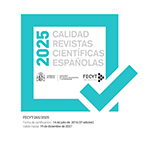Essentialism, normativism, postmodernism: ethnic interpretations in Spanish archaeology
Abstract
This article presents a diachronic view of the ways in which Spanish Archaeology has approached the study of past ethnicity and consequently the image this has created of the peninsular “peoples”. To this end we begin with a review of the precedents contained in the historiography of the Early Modern Period which will be followed by a look at the initial phases of the discipline, the introduction of the cultural-historical method of the German School and the influence of the Franco regime. In the final section we will examine the approaches used since the beginning of the 1980s as well as the public interest and debate this issue has created as a result of the development of the Autonomous Communities.Downloads
Article download
License
In order to support the global exchange of knowledge, the journal Gerión. Revista de Historia Antigua is allowing unrestricted access to its content as from its publication in this electronic edition, and as such it is an open-access journal. The originals published in this journal are the property of the Complutense University of Madrid and any reproduction thereof in full or in part must cite the source. All content is distributed under a Creative Commons Attribution 4.0 use and distribution licence (CC BY 4.0). This circumstance must be expressly stated in these terms where necessary. You can view the summary and the complete legal text of the licence.












